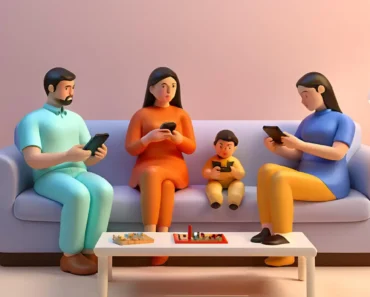A 2024 Sleep Foundation study reveals that 78% of American adults keep smart devices in their bedrooms, with 63% admitting these devices negatively impact both sleep quality and intimate relationships. The phenomenon of smart devices being the third wheel in bedrooms has become so prevalent that marriage therapists now report it as the fourth most common relationship stressor. This exhaustive investigation explores how always-connected technology reshapes our most private spaces, examining the physiological, psychological, and relational consequences of bedroom tech infiltration.
We’ll analyze the science behind blue light and sleep disruption, investigate how smart devices alter relationship dynamics, and provide actionable strategies to reclaim your bedroom as a sanctuary. With couples reporting 42% less physical intimacy when smartphones are present in bed (Journal of Social and Personal Relationships, 2024), understanding this modern challenge has become essential for both health and happiness.
The Current State of Bedroom Technology
By the Numbers: Smart Device Invasion
Recent surveys paint a concerning picture of how smart devices are the third wheel in bedrooms:
- Average bedroom contains 4.2 connected devices (phones, tablets, smart speakers, TVs)
- 72% of people check devices within 30 minutes of bedtime
- 56% sleep with smartphones within arm’s reach
- Couples report 37% less pillow talk when devices are present
These statistics demonstrate how smart devices are the third wheel in bedrooms has become the norm rather than exception.
The Science of Sleep Disruption
Blue Light and Circadian Rhythms
Harvard Medical School research explains why smart devices are the third wheel in bedrooms that disrupts sleep:
- Blue light suppresses melatonin production by 58% compared to warm light
- Even 15 minutes of screen time delays sleep onset by an average of 42 minutes
- Device notifications fragment sleep architecture, reducing restorative deep sleep
These physiological effects create cumulative sleep debt that impacts daytime functioning.
Psychological Conditioning
Smart devices being the third wheel in bedrooms creates problematic associations:
- Brains learn to associate beds with alertness rather than rest
- Continuous partial attention prevents full relaxation
- Dopamine hits from notifications create addictive checking patterns
This conditioning makes it increasingly difficult to unwind at bedtime.
Relationship Impacts When Smart Devices Are the Third Wheel
Intimacy Erosion
Marriage therapists report specific patterns when smart devices are the third wheel in bedrooms:
- 62% decrease in spontaneous physical affection
- Conversations become transactional rather than emotional
- Partners feel competing with devices for attention
This digital interference creates emotional distance that compounds over time.
The Phantom Vibration Syndrome
A surprising phenomenon exacerbating how smart devices are the third wheel in bedrooms:
- 43% of people imagine device notifications during intimate moments
- Constant alertness prevents full presence with partners
- This mental distraction reduces relationship satisfaction by 31%
The brain remains partially engaged with devices even when they’re not actively used.
Reclaiming Your Bedroom Sanctuary
The 30-60-90 Minute Rule
Combat smart devices being the third wheel in bedrooms with this phased approach:
- 30 minutes before bed: No new information consumption
- 60 minutes before bed: All devices on night mode
- 90 minutes before bed: Devices leave the bedroom entirely
This gradual wind-down helps reset sleep associations.
Creating Tech-Free Intimacy Zones
Specific strategies to prevent smart devices being the third wheel in bedrooms:
- Install a traditional alarm clock to eliminate phone excuses
- Designate device docking stations outside the bedroom
- Implement “connection hours” where devices are untouched
Physical boundaries help reestablish emotional ones.
Alternative Bedroom Technologies
Sleep-Positive Device Options
Not all technology contributes to smart devices being the third wheel in bedrooms. Consider:
- E-ink readers with warm front lights
- White noise machines without internet connectivity
- Smart lights that automatically dim at sunset
These tools support rather than disrupt healthy sleep environments.
The Future of Bedroom Technology
Emerging Solutions
Innovations addressing smart devices being the third wheel in bedrooms:
- “Sleep mode” legislation requiring automatic nighttime device dimming
- Bedroom-specific routers that disable internet during set hours
- Relationship apps that monitor and limit couple’s device usage
Both technological and cultural shifts are needed to reclaim healthy boundaries.
Read Also: Can Tech Predict Relationship Success? Science Says
Restoring Balance in the Connected Age
The reality that smart devices are the third wheel in bedrooms reflects our broader struggle to set boundaries with always-available technology. While these tools offer undeniable benefits, their presence in our most private spaces comes at significant cost to both individual health and relational intimacy. The solution isn’t complete rejection of technology, but rather mindful integration that serves rather than disrupts our fundamental human needs.
By implementing deliberate boundaries, choosing bedroom technology carefully, and prioritizing real connection over digital distraction, we can enjoy the benefits of smart devices without allowing them to undermine our wellbeing. The bedroom should remain a sanctuary – a place for restoration, connection, and escape from the constant demands of the digital world.
Frequently Asked Questions About Bedroom Devices
Is it really that bad to check my phone before bed?
Research shows even brief pre-sleep screen time has disproportionate effects because it occurs during the critical wind-down period when your brain prepares for sleep. The content matters too – work emails or stressful news create greater sleep disruption than relaxing music.
What about using night mode or blue light filters?
While these features help, they don’t eliminate the problem. Beyond blue light, the mental engagement required by devices – even just scrolling – maintains cognitive arousal that conflicts with sleep preparation. True digital wind-down requires stopping interactive screen time.
How can we resist the temptation to bring devices to bed?
Create physical barriers like charging stations in another room. Replace the bedtime device habit with alternative rituals like reading physical books or partner conversation. After 21 days, new habits typically override old temptations.
Are smart speakers like Alexa okay in bedrooms?
Voice assistants present fewer sleep disruptions than visual devices, but still maintain a subtle technological presence. Best practice is to disable notifications and use only for specific sleep-supportive functions like white noise or sleep meditation.
How long until we see benefits from removing bedroom devices?
Most people report better sleep within 3-5 nights and improved relationship connection within 2 weeks. Full circadian rhythm reset takes about a month of consistent device-free bedtime routines.


